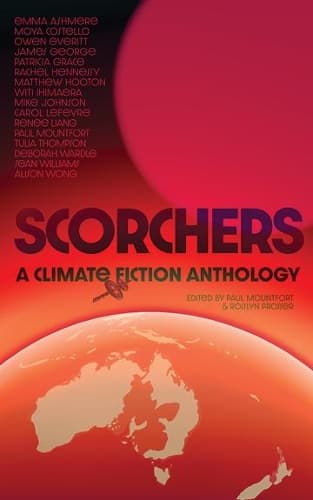Review: Scorchers: A Climate Fiction Anthology
Reviewed by Angelique Kasmara
Dystopian futures set in a climate change-ravaged Earth aren't a new thing in literature: JG Ballard’s The Drowned World was published in 1962; Octavia Butler’s Parable of the Sower in 1993. However, a check of the world’s temperature indicates that cli-fi will soon be seeping through everything from romance to memoir. New anthology Scorchers, published by Steam Press, edited by Paul Mountfort and Rosslyn Prosser, tackles this most urgent of issues through the lens of literary fiction. This, “the first ever pan-Australasian anthology of cli-fi writings,” boasts some of Aotearoa New Zealand’s most acclaimed writers such as Patricia Grace, Witi Ihimaera and Alison Wong.
Wrapping up 2020 with a collection which offers 16 different scenarios of humanity’s bleak future feels about right. The editors state that by, “confronting this collective demon of our own making, writers and artists can lead the way in activating our imaginative responses to the pass in which we find ourselves.” But leave it up to Patricia Grace to capture it best. In her glorious story Unremembering, of Rona, the woman who, “was the one pulled up to the moon for swearing,” she writes:
“Unremembering? Unremembering? I think you’re being too polite,’ said Rona. ‘I mean this is serious…’
“Unremembering about interdependence, unremembering about the mauri of all things, unremembering that all have an important place in the universe. These most junior, last-to-be-made, or last-to-become, knew their place once.”
“Unremembering” is why we’re in this mess, the Moon in Grace’s story observes. Unremembering is also what storytellers rail against, in our bid to create the unforgettable. In Tāwhaki, Witi Ihimaera combines humour, pathos and outer space into an effervescent potion, perfectly rendered. Tulia Thompson brings in a Pacific climate change refugee perspective to Serf. James George stitches together a moving piece in Whenua Whenua, as does Renee Liang with her exchange between doctor and patient in The Waterfall. Alison Wong’s The Garden, grounded in the now, is a reminder that the world clock has already shuddered past the timelines that George Orwell and Margaret Atwood laid out before us.
Wong has dual Australian/New Zealand citizenship, and part of her story documents the current difficulties of trans-Tasman travel. Fellow Australian Rachel Hennessey brings style and swag to her story about a potty-mouth robot, The Bird Around My Neck. “Why you being so formal, Katie?” it asks belligerently, while Katie tiptoes around it, the love of her life reduced to silicon moulded around a memory chip. Matthew Hooton (not to be confused for another Matthew Hooton) evokes past, present and future in his mesmerising piece Evander Holyfield dreams through time to steal George Foreman's blueprint for the perfect non-stick electric grill; Owen Everitt’s Menindee is pleasingly visceral and Sean Williams’s Five Articles Selected at Random from the Scarlet Exposition makes fantastic use of the words ‘red’ and ‘green’.
There’s some terrific writing here but the collection gets bogged down in parts under its own weight, with a couple of odd inclusions that don’t deliver quality. Pushing through exposition within the confines of a short story is difficult enough inside a familiar setting and made even complex when dealing with a speculative universe: I would have welcomed more vigorous editing within several pieces. A number of typos were distracting (like misspelling cockatoo in a title).
New Zealanders and Australians are both guilty of ignoring each other’s contributions to literature, so it’s encouraging to see this trans-Tasman collaboration. A diversity of perspectives is part of the kaupapa. The editors, in their (somewhat pompous) introduction, argue that, “we urgently require representation from across cultures, and especially from identities, communities and world views which often do not adequately figure in the dominant, even phallogocentric discourses of science, technology and the economy.”
However, this is by no means a comprehensive collection. The back cover blurb states that some of “Australia and New Zealand’s most celebrated authors” are included here, but there’s a notable absence of any of New Zealand’s Sir Julius Vogel award-winning writers of speculative fiction (Australia at least brings in bestselling sci-fi author Sean Williams). Some of these, like multiple award-winning authors Lee Murray and Octavia Cade, who also have a bunch of science degrees between them, have been imagining cli-fi scenarios for a good amount of time.
Which makes Scorchers feel a bit like a David Bowie theme night thrown together for those who only discovered him during the Let’s Dance years. I’m not going to presume the reason for the lack of, but I would’ve liked their perspectives included in what’s been possibly the world’s most reality meets sci-fi year ever.
Reviewed by Angelique Kasmara
